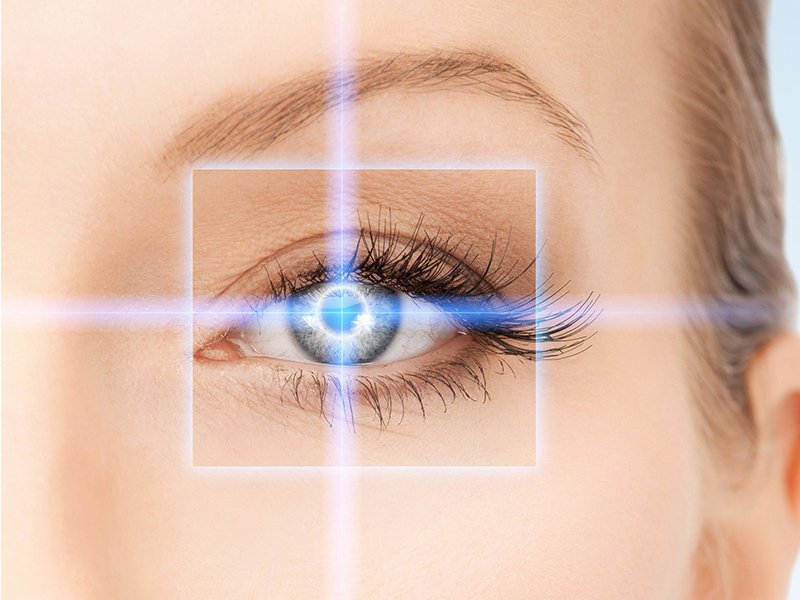Refractive Services
LASIK & REFRACTIVE
What is Lasik?
Lasik stands for “LASER-IN-SITU Keratomileusis” where in a Microkeratome or the laser beam ( Intralase) creates a hinged corneal flap and llaser beam then gently reshape the corneal bed and the flap is put back in position, which is a absolutely painless procedure.
Lasik is an outpatient laser surgical procedure used to correct myopia (near sight), Hyperopia ( far sight ) and Astigmatism.
Why Should you consider Lasik?
For many years the only way people could correct their vision was to wear spectacles . Over the last forty years, contact lenses have become increasingly popular as their design and availability has improved. Lasik has rapidly gained acceptance as a realistic alternative and enabled millions world wide to enjoy a new found freedom living lives without the inconvenience of glasses or contact lenses.
Who are the patients not fit for Lasik procedure?
- Patients with very thin corneas
- High refractive errors. ( more than -14.0 D Sphere )
- Unstable refraction
- Patients with ocular problems like keretoconus ( thin &irregular corneas), dry eye, past history for infections , etc.
- Retina detachment & other hereditary retinal problems.
Is there any proven record?
Any person above age of 18 years is a good candidate for lasik surgery . The glass / contact lense power should have been stable for the last 12 months.
How long will the procedure take?
The procedure itself takes only few minutes. You may have to spend a total 2-3 hours in the hospital.
When can I get back to work?
You should be able to get back to work in 3-4 days . Both the eyes can be done on the same day.

Is it necessary to undergo repeat procedure?
In the rare event of an under correction or regression you may have to undergo a repeat procedure, at no extra cost. This depends on your corneal thickness and other factors which you surgeon decides.
Will the Procedure hurt?
The lasik procedure itself is completely painless i.e. no injection. It is done using eye drops only. After the procedure you may have a mild discomfort in the form of a foreign body and watering sensation for few hours.
What are the risks?
The chances of having vision reducing complications are less that 1%. There have been no reported cases of blindness from lasik so far. Some peoplemay experience fluctuation in vision, glare and haloes at night which usually reduces with time.
Patient over the age of 40 will require reading glasses. There are some rare complication ( 0.5%) like corneal ectasia, flap problem ect. “ Over 1 million lasik procedure have been performed worldwide over in the last 10 years.
What should I expect before during and after LASIK surgery?
Before Surgery:
- Once you have decided to go ahead with lasik surgery, you will require a base line evaluation by your doctor to determine if you are a good candidate. You should not feel pressurized by you doctors, family friends or anyone else to make a decision about having surgery. You should undergo only if you are totally convinced.
- If your are wearing contact lenses it is necessary to stop wearing them before your baseline evolution and switch to wearing your glasses full time.
- Lasik is not done during pregnancy and location; clarify all your doubts and anxieties with the doctor.
- The day before surgery, you should stop using creams, lotions, make –up or perfumes.
- Arrange to be driven back after surgery as driving is not possible immediately after surgery.
During Surgery:
An anaesthetic drop will be put in your eye and the area around your eye will be cleaned. During the procedure your vision will dim and you may experience some discomfort. To keep your eye fixed you will be asked to state at a light. Once the eye is fixed the doctor will start the laser. A computer controls the amount of laser delivered to your eyes.
An anaesthetic drop will be put in your eye and the area around your eye will be cleaned. During the procedure your vision will dim and you may experience some discomfort. To keep your eye fixed you will be asked to state at a light. Once the eye is fixed the doctor will start the laser. A computer controls the amount of laser delivered to your eyes.
After Surgery:
- Immediately after the procedure, you eye may burn, itch or feel like there is somwthing in it. You may experience some discomfort, ot in some case , mild pain.
- Both the eyes may tear or water. Your vision will probably be hazy or blurry. Never rub your eyes as rubbing could disturb the flap in the first week.
- You may also experience sensitivity to light, glare or haloes around light. All this symptoms should improve considerably within the first few days after surgery.
- You should see your doctor and apply the drops as advised.
- Do not resume wearing contact lenses in the operated eye even if your vision is blurred.
- Avoid non- contact sports for 1 week, avoid using lotions, creams, or makeup around the eyes for 1week.
- Avoid strenuous contact sports like boxing , football, karate, swimming etc, for 4 week, during the first few months after surgery, your vision may fluctuate do not drive in the night during the first few days after the surgery.

